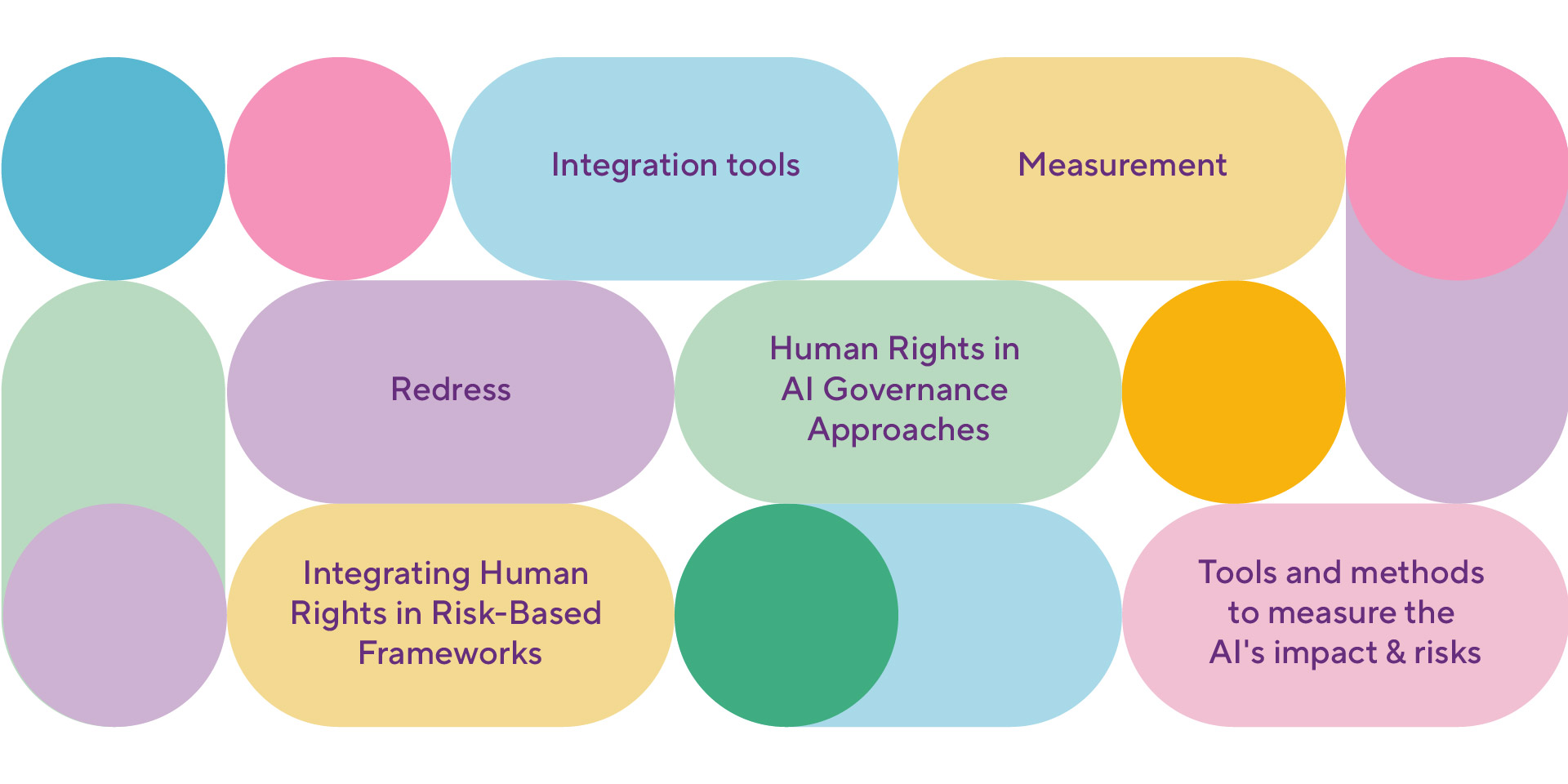Human Rights in AI Conference
An international conference hosted at Mila, in Montreal from February 14 to 16, 2024.
An international conference hosted at Mila, in Montreal from February 14 to 16, 2024.

Bringing together key stakeholders from the academic (machine learning, law and social sciences), civil society and policy maker communities, Protecting Human Rights in the Age of AI aims to highlight and advance the critical efforts needed to incorporate human rights into artificial intelligence (AI) governance mechanisms.
This event invites experts and members of civil society to partake in discussions on topics ranging from human rights impact assessments, tools and methods for risk-measurement, and the availability of redress mechanisms. The objective is to further the protection of human rights in the age of AI by learning to integrate them in risk-based governance approaches.

Benjamin Prud’homme is the Vice-President, Policy, Society and Global Affairs at Mila. In his role, he leads Mila's work on AI governance and policy, learning and literacy, Responsible AI, as well as its AI for Good portfolio of applied projects. His focus areas include AI governance, with a particular emphasis on multilateral forums, human rights, and the inclusion of marginalized communities in the lifecycle of AI (eco)systems - knowledge he will build upon to moderate discussions on the integration of human rights within risk-based AI policy approaches.
Benjamin is a lawyer and the former human rights and multilateral relations advisor to the Minister of Foreign Affairs of Canada. He also was co-editor of the Mila-UNESCO publication « Missing Links in AI Governance ». He sits on the Board of Directors of human-rights and LGBTQ2 community organizations including the Canadian Civil Liberties Association and the Observatoire québécois des inégalités as well as being Vice-President of Legal Aid in Montreal. Benjamin currently co-leads the Global Partnership on AI (GPAI) project "Creating Diversity and Gender Equality in AI Ecosystems" and was an expert for the United Nations Broadband Commission's Working Group on AI Capacity Building.

Catherine Régis is a full professor of law at the University of Montreal, holder of a Canada-CIFAR Chair in AI (Mila) and a Canada Research Chair in health law and policy. She is an Associate Academic Member at Mila and the Director of social innovation and international policy at IVADO. She is an Expert Member for the Responsible AI Working Group of the Global Partnership on AI (GPAI), a group she has co-chaired from 2021 to 2023, and she leads the human-centred AI work for the U7+, an academic alliance gathering more than 50 universities worldwide. Catherine also participated in the creation of the Montreal Declaration for a responsible development of artificial intelligence as a member of its scientific committee. Her work focuses on global AI governance, the regulation of AI in health care systems and on the integration of human rights approaches in AI.
She will bring her legal expertise to animate discussions about the tools, measurement frameworks and metrics available to assess and ensure the integration of human rights into the development and deployment of AI systems, both regionally and internationally and how to implement them.

Nathalie Smuha is an Emile Noël Fellow at the NYU School of Law and Assistant Professor at the KU Leuven Faculty of Law where she focuses on the intersection of law, philosophy and technology. Her research spans EU and international law and examines legal and ethical questions around artificial intelligence (AI) and other digital technologies. She is particularly interested in the impact of AI on human rights, democracy and the rule of law, and will draw on her expertise to lead the panel discussion on the avenues of redress available to protect human rights in the deployment of AI systems
Over the last years, discussions over AI governance issues and opportunities have often evolved in parallel with human rights frameworks, leaving the space where the two connect and interact under explored. Yet, human rights should be a pillar of any responsible AI governance strategies, at the national and global level. Notably, the international human rights framework provides a rare space of consensus to build on as states have agreed to ensure their respect. This panel will dive into this important topic and explore the following questions: On a practical level, how can we ensure that human rights become embedded in AI governance strategies? What specific tools have shown the most promising results in that respect? How can human rights become a clear and activable indicator to allow AI development, deployment, and monitoring that leaves no one behind?
Speakers : Eliza Aspen, Wanda Munoz, Clara Neppel, Karine Perset
Moderator : Catherine Régis
Redress mechanisms play a crucial role in holding accountable those responsible for AI-related human rights infringements and providing avenues for justice and restitution to affected individuals and groups. These mechanisms not only serve as a deterrent ex ante, but they also contribute to building trust in AI technologies by ensuring that redress can be sought in case of harm ex post.
Given the importance of adequate redress mechanisms, this panel will focus on the following questions: which type of remedies are currently available when human rights infringements occur? What challenges do people face to obtain redress in an AI context? And (how) should redress mechanisms be revised to ensure their continued effectiveness in an ever more AI-driven world?
Speakers : Fanny Hidvégi, Aziz Huq, Jake Okechukwu Effoduh, Nele Roekens
Moderator : Nathalie Smuha
2023 has witnessed a dramatic increase in global AI governance efforts. Most multilateral organizations have now identified AI governance as a priority, with the year having culminated - among other initiatives - in the UK AI Safety Summit and the creation of the UN AI Advisory Body. It is to be expected that the coming months and years will therefore see the emergence of key initiatives that will shape the future of AI governance internationally. These will raise the fundamental question of what importance the human rights framework must be given in shaping such initiatives, when national and regional regulating bodies have thus far prioritized risk-based approach mechanisms. What are the conditions needed to create momentum for human rights as this conversation evolves globally? What do international organizations need to support the integration of human rights in their respective work, and how can stakeholders - civil society, academia, industry - play a role in leading this effort?
Speakers : Virgina Dignum, Neema Lugangira, Patrick Penninckx, Cédric Wachholz
Moderator : Benjamin Prud’homme

Founded by Professor Yoshua Bengio of the University of Montreal, Mila - Quebec AI Institute is an artificial intelligence research institute that brings together over 1,200 researchers specializing in machine learning. Based in Montreal, Mila’s mission is to be a global hub for scientific advances that inspire innovation and development of AI for the benefit of all.
Participants wishing to stay in Montreal during the event have access to a preferential rate at Hotel Monville located in the heart of the Montreal International District. Reservations can be made online using the promotional code MILA24.



